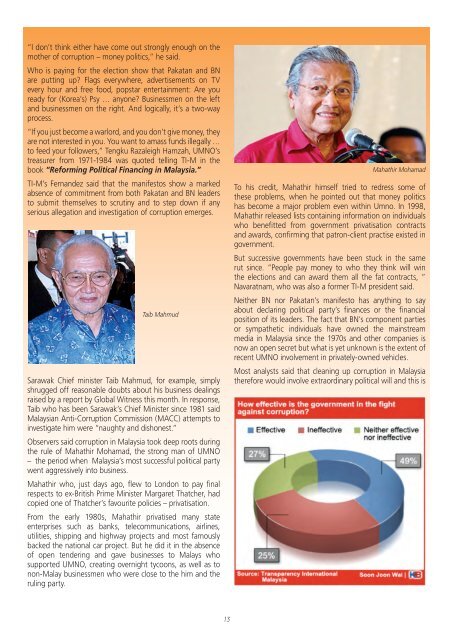Sept 2012-Mar 2013 - Transparency International Malaysia
Sept 2012-Mar 2013 - Transparency International Malaysia
Sept 2012-Mar 2013 - Transparency International Malaysia
You also want an ePaper? Increase the reach of your titles
YUMPU automatically turns print PDFs into web optimized ePapers that Google loves.
“I don’t think either have come out strongly enough on themother of corruption – money politics,” he said.Who is paying for the election show that Pakatan and BNare putting up? Flags everywhere, advertisements on TVevery hour and free food, popstar entertainment: Are youready for (Korea’s) Psy … anyone? Businessmen on the leftand businessmen on the right. And logically, it’s a two-wayprocess.“If you just become a warlord, and you don’t give money, theyare not interested in you. You want to amass funds illegally …to feed your followers,” Tengku Razaleigh Hamzah, UMNO’streasurer from 1971-1984 was quoted telling TI-M in thebook “Reforming Political Financing in <strong>Malaysia</strong>.”TI-M’s Fernandez said that the manifestos show a markedabsence of commitment from both Pakatan and BN leadersto submit themselves to scrutiny and to step down if anyserious allegation and investigation of corruption emerges.Taib MahmudSarawak Chief minister Taib Mahmud, for example, simplyshrugged off reasonable doubts about his business dealingsraised by a report by Global Witness this month. In response,Taib who has been Sarawak’s Chief Minister since 1981 said<strong>Malaysia</strong>n Anti-Corruption Commission (MACC) attempts toinvestigate him were “naughty and dishonest.”Observers said corruption in <strong>Malaysia</strong> took deep roots duringthe rule of Mahathir Mohamad, the strong man of UMNO– the period when <strong>Malaysia</strong>’s most successful political partywent aggressively into business.Mahathir who, just days ago, flew to London to pay finalrespects to ex-British Prime Minister <strong>Mar</strong>garet Thatcher, hadcopied one of Thatcher’s favourite policies – privatisation.From the early 1980s, Mahathir privatised many stateenterprises such as banks, telecommunications, airlines,utilities, shipping and highway projects and most famouslybacked the national car project. But he did it in the absenceof open tendering and gave businesses to Malays whosupported UMNO, creating overnight tycoons, as well as tonon-Malay businessmen who were close to the him and theruling party.Mahathir MohamadTo his credit, Mahathir himself tried to redress some ofthese problems, when he pointed out that money politicshas become a major problem even within Umno. In 1998,Mahathir released lists containing information on individualswho benefitted from government privatisation contractsand awards, confirming that patron-client practise existed ingovernment.But successive governments have been stuck in the samerut since. “People pay money to who they think will winthe elections and can award them all the fat contracts, ”Navaratnam, who was also a former TI-M president said.Neither BN nor Pakatan’s manifesto has anything to sayabout declaring political party’s finances or the financialposition of its leaders. The fact that BN’s component partiesor sympathetic individuals have owned the mainstreammedia in <strong>Malaysia</strong> since the 1970s and other companies isnow an open secret but what is yet unknown is the extent ofrecent UMNO involvement in privately-owned vehicles.Most analysts said that cleaning up corruption in <strong>Malaysia</strong>therefore would involve extraordinary political will and this is13


